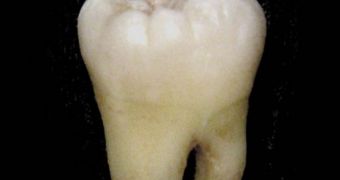According to investigators, human teeth are extremely sensitive to recording information about past experiences we may have encountered, in the sense that they store data on the environmental pollution and radiation levels we came across at some point in our lives. Knowing this, a group of researchers is currently working on developing an advanced method of deriving these dataset from our teeth, in manner that could yield results which are usable in practical applications. They say that this line of study also has tremendous implications for national security.
Team members from the new initiative say that enamel – the hard layer covering the outside of our teeth – can store radiation readings with great accuracy. They add that devising a way of understanding them could provide emergency responders with methods of determining precisely how much radiation a certain individual was exposed to, for example in the case of a dirty bomb explosion. “Dental enamel is quite a remarkable material. There's a world of information in the tooth,” Howard University in Washington College of Dentistry professor Barry Pass says, quoted by LiveScience.
The expert and his team are currently working on developing a new technology, called Electron Paramagnetic Resonance (EPR), which could basically assess the levels of free radicals inside materials such as enamel. These substances are atoms with an extra, unpaired electron, which tend to be in the habit of replenishing their pairs by stealing electrons from healthy tissue and DNA. This makes them very damaging to healthy tissue, but they are also produced in specific amounts when a person is exposed to radiation. Therefore, they can accurately be used as a marker to gage the degree of exposure a certain individual has had.
“These free radicals are generated in proportion to the radiation exposure. The absorption of microwave energy is proportional to the concentration of these free radicals,” explained Pass earlier this month, at the meeting of the American Physical Society, held in Washington, DC. He added that the team's new method relied on bombarding a small sample of tooth with microwave radiation. Apparently, free radicals absorb wavelengths in this particular region of the electromagnetic spectrum. “Ideally what we want for rapid triage is something that's non-invasive. You want to be able to get unambiguous data so you can triage or break down the victims into subclasses. You want to be able to operate in a variety of environments by minimally-trained individuals,” he concluded.

 14 DAY TRIAL //
14 DAY TRIAL //